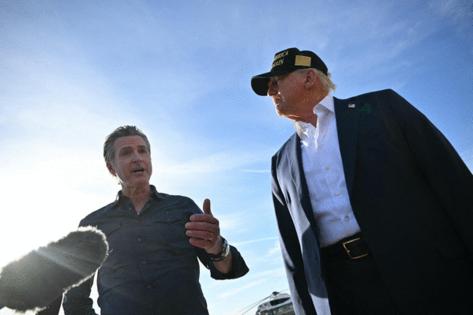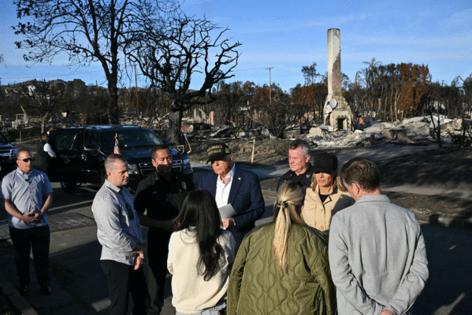Visiting LA after firestorm, Trump focuses on overhauling California water policy
Published in Political News
LOS ANGELES — During a visit to Los Angeles burn areas Friday, President Donald Trump sought to convince California officials that the state’s system of water management needs a dramatic overhaul.
Trump announced that he was set to approve an executive order “to open up the pumps and valves in the north.”
“We want to get that water pouring down here as quickly as possible, let hundreds of millions of gallons of water flow down into Southern California, and that’ll be a big benefit to you,” he told a gathering of city, county and state officials at Los Angeles Fire Department Station 69 in Pacific Palisades.
“We have to have that water. You’re talking about unlimited water,” Trump said. “You’ll never run out, you’ll never have shortages, and you won’t have things like this, and when you do, you’ll have a lot of water to put it out.”
Experts said Trump’s statements attempting to link the firefighting response and local water supplies to how water is managed in Northern California were inaccurate. Water managers and researchers have said that Southern California’s cities are not currently short of water, and that the region’s reservoirs are at record high levels following plentiful deliveries of supplies in 2023 and 2024.
Earlier this week, Trump issued an order to put “people over fish,” ordering federal agencies to restart work to “route more water” from the Sacramento-San Joaquin River Delta to other parts of the state “for use by the people there who desperately need a reliable water supply.”
Trump has also said he wants to tie federal aid for wildfire recovery to whether California accepts changes in water policy.
Gov. Gavin Newsom, who met Trump briefly at Los Angeles International Airport, has said a change in water management in Northern California would not have affected the fire response. The governor’s office said on social media this week that California “pumps as much water now as it could under prior Trump-era policies,” and that “there is no shortage of water in Southern California.”
Even with ample supplies in reservoirs, local water systems were pushed to their limits as the fires rapidly spread, driven by strong winds.
When the L.A. County water system lost pressure in parts of Pacific Palisades, some fire hydrants ran dry in high-elevation areas, hindering the firefighting effort. Newsom last week ordered an investigation into the loss of water pressure to hydrants and the lack of water available from a reservoir in Pacific Palisades that was out of commission for repairs.
“There was plenty of water available in Southern California at the time these fires broke out,” said Bruce Reznik, executive director of the environmental advocacy group Los Angeles Waterkeeper. “The president’s proposed solutions for improving water security in our region are impractical and based on a faulty understanding of the state’s water system.”
During a visit to North Carolina earlier Friday, Trump said he intended to find out “why they aren’t releasing the water.”
Trump similarly tried to alter California water regulations and policies during his first term. But when his administration adopted water rules that weakened environmental protections in the delta, the state and conservation groups successfully challenged the changes in court.
That cleared the way for the Biden administration, working together with Newsom’s administration, to develop the current plan and the supporting biological opinions, which determine how much water can be pumped and how river flows are managed in the delta.
The rules govern the operation of dams, aqueducts and pumping plants in the Central Valley Project and the State Water Project, two of the world’s largest water systems, which deliver supplies to millions of acres of farmland and about 30 million people.
Pumping to supply farms and cities has contributed to the ecological degradation of the Delta, where the fish species that are listed as threatened or endangered include steelhead trout, two types of Chinook salmon, longfin smelt, delta smelt and green sturgeon.
Trump indicated he intends to seek to weaken protections for the delta smelt, a finger-length species that has suffered major declines and is thought to be nearing extinction in the wild.
“They talk about the delta smelt,” Trump said. “It doesn’t have to be protected. The people of California have to be protected.”
U.S. Rep. Vince Fong, R-Calif., thanked Trump for his positions, saying that “ensuring reliable, stable water supplies is critical.”
Fong said Trump’s executive order “would have a great impact.”
Trump said the changes would benefit California agriculture, saying Central Valley farmlands have been deprived as “they send the water out into the Pacific Ocean.”
Trump is seeking to alter California water policy at a time when Newsom is pursuing large water infrastructure projects, including a $20-billion plan to build a water tunnel beneath the delta, and a plan to build Sites Reservoir in Northern California, the state’s first new major reservoir in decades.
Trump did not discuss these projects during his visit.
Karla Nemeth, director of California’s Department of Water Resources, has said Trump’s plans could end up harming water supplies for farms and communities as well as threatened fish populations.
Environmental advocates say Trump’s orders could prove disastrous for salmon and other fish species, as well as the deteriorating ecosystem of the delta.
Reznik said that instead of the approach Trump is taking, the federal government could help the L.A. region by providing more investments to improve the resilience of its local water systems.
“More money spent on wastewater recycling, stormwater capture, groundwater cleanup and conservation would prepare us for the future,” Reznik said. “Sending more water to Central Valley agriculture will not.”
Reznik and other critics said the changes that Trump is seeking would threaten endangered fish and the deteriorating ecosystem of the Sacramento-San Joaquin River Delta.
Pumping more water from the delta via the federally managed Central Valley Project would primarily benefit agriculture in the San Joaquin Valley, where Trump enjoys some of his strongest support in the state.
“Every American should be clear about what the president is doing here,” Reznik said. “In a time of extreme crisis and tragedy, he is using this emergency to line the pockets of his wealthy benefactors — in this case, industrial agricultural producers in the San Joaquin Valley — at the expense of the rest of us.”
©2025 Los Angeles Times. Visit at latimes.com. Distributed by Tribune Content Agency, LLC.































































Comments